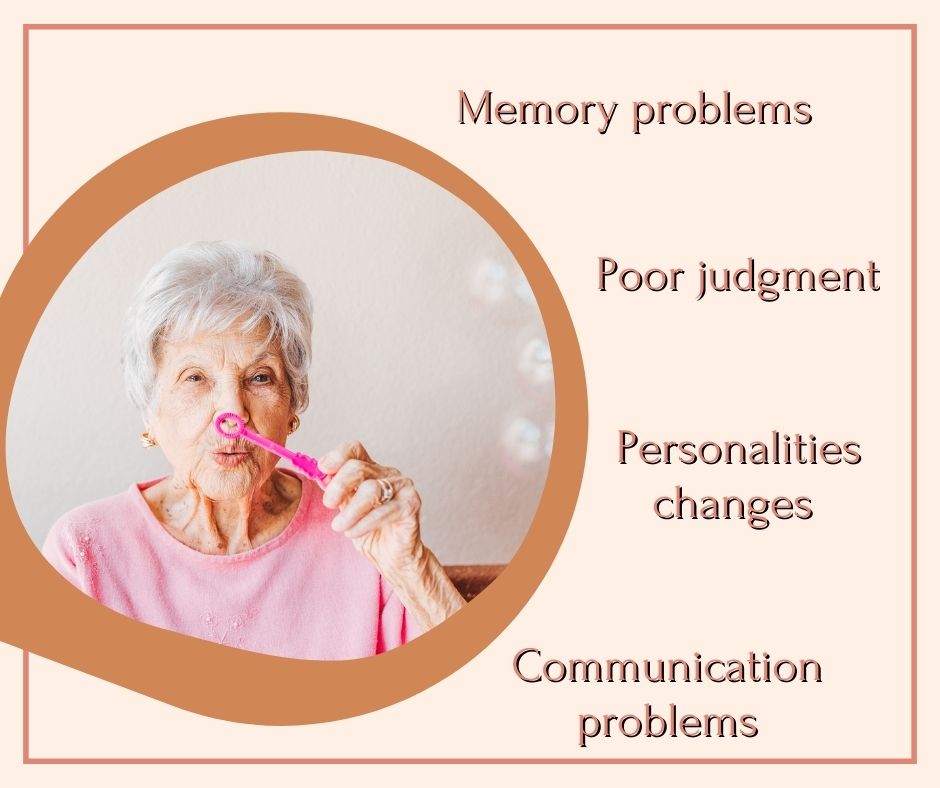Neurodegenerative diseases are also known as degenerative nerve diseases, which occur due to slow progressive loss of neurons in the human brain. These diseases are also age-dependent disorders that are increasingly prevalent among the elderly population for years. However, most neurodegenerative diseases are incurable, and some might be serious and become life-threatening.
Alzheimer’s disease is one of the most common neurodegenerative diseases.
It is a condition occurred when the brain cells damaged or subjected to destruction due to the formation of neurofibrillary tangles and beta-amyloid plaques. Neurofibrillary tangles are insoluble twisted fiber consisted of protein “tau” that accumulated inside the brain’s cells; beta-amyloid plaques are the sticky clumps of protein fragments that build-up between brain cells. Both the tangles and plaques accumulated in the brain can damage or even cause the brain cells to die, hence will affect the brain’s functions and lead to Alzheimer’s disease. Alzheimer’s disease often causes dementia, which is a general term of memory loss or other cognitive functions such as thinking, remembering, making decisions, and even affect some behavioral activities. It is an irreversible condition that will worsen over time. Currently, Alzheimer’s disease is no cure, but treatments or drugs may temporarily slow down the disease worsening.

Signs and symptoms:
- Memory problems. The most common symptom of Alzheimer’s disease is memory problems, such as forgetting the recently learned information, difficult to remember things that happened recently, repeat asking for the same question and answer, losing or misplacing things in an odd place, confusion with time or place, etc.
- Poor judgement or bad decision making. Alzheimer’s patients would have trouble in dealing with money, paying bills or take a longer time to complete normal daily tasks due to affected thinking ability and cognitive difficulties.
- Changes in mood and personalities. Alzheimer’s patients may have impulsive behaviors, increase anxiety, depressed, confused, and inappropriate outburst of anger.
- Movement and communication problems. Alzheimer’s disease causes brain cells to die and hence will affect speaking, reading, walking, writing, swallowing or other bodily movements.
- Other symptoms: hallucination, weight loss, problems on recognizing family and friends, loss control of bowel or involuntary urination, shortened attention span, etc.
Risk factors:
Genetics or family history: Gene is the main factor of early-onset Alzheimer’s disease. Early-onset Alzheimer’s disease has occurred during gene changes that cause familial Alzheimer’s disease (FAD) between the age of 30’s to 60’s.
Age: Aging increase the risk of Alzheimer’s disease. The risk will be higher for the elderly population, which is age 65’s or above.
Head injuries: Head injury might cause damage to the brain and mental health, and for a severe condition, it will affect the brain functions and increase the risk of neurodegenerative diseases.
Other factors: Risk increased with the condition that can damage the heart and blood vessels. Other risk factors such as unhealthy diet, lack of physical activities, smoking, alcohol abuse, etc., might also increase the risk of Alzheimer’s disease.
Preventions:
Even though Alzheimer’s disease is no cure, but efforts with a healthy lifestyle might be able to slow down or even preventing the development of Alzheimer’s.
1. Exercise regularly. Exercise is important in the prevention of various chronic diseases. Exercises can improve blood circulation, strengthen immunity, increase muscle strength, boost memory, and beneficial to brain, lung, and heart health. Walking for 10 minutes a few times per day is one of the exercises that are beneficial to our body health.
2. Social engagement. Examples of social engagement include joining social activities or take group classes such as travel with group tours, visit community center, or joining yoga classes. These allow people to develop new friendships, stimulates mind and memory, and help to maintain emotional health.
3. Healthy diet. Practicing a healthy diet may also help to prevent chronic diseases and reduce the risk of Alzheimer’s disease. A diet rich in omega-3 fatty acids can help to reduce the formation of beta-amyloid plaques and maintaining brain health. Examples of foods rich in omega-3 are salmon, mackerel, walnut, chia seed, flaxseed, etc.
4. Mental stimulation. Keep learning or enjoy games that challenge the brain throughout life can improve brain and mental health. Games such as Sudoku, crossword puzzles, cards, or chess, these games can be the brain teasers that provide a great mental workout and challenge the brain.
5. Protection against head injuries. Prevent head injuries by wearing an appropriate helmet when participate in sport activities such as cycling, skating, and hockey; Always wear a helmet when riding a motorcycle and wear a seat belt in the motor vehicle.
6. Regular health check-up. A regular health check-up lets you know your body condition well. Early detection of signs and symptoms of any health problems can prevent the condition worsen.
GNE Gold-G® Health Food Series:
Gold-G® Bio Sea Cucumber
Gold-G® Bio Sea Cucumber is a traditional health supplement containing high concentration of sea cucumber extract, which is rich in omega 3 fatty acids, cerebrosides, saponin, and taurine that are beneficial to brain health.
- Omega 3 fatty acids work as antidepressant and help in mood disorder, which also plays a crucial role in growth and development of brain system.
- Cerebroside helps to reduce oxidative damage in brain and nervous system.
- Saponin can prevent cerebral palsy and spasm caused by concussion due to head injuries.
- Taurine is important for brain development. It improves nerve signal conductions in brain, hence able to promote learning and memory abilities.
Gold-G® Antarctic Gold Krill Oil
Krill oil is an increasingly important source of omega-3 fatty acids specific for DHA and EPA, contains abundant of astaxanthin, and consists phospholipid which provides better bioavailability.
- Omega-3 fatty acids are important for brain development. It can improve cognitive function prevent dementia, improve depression and emotional problems. It can help to enhance memory and learning abilities. Besides, Omega-3 also demonstrated anti-inflammatory activity and lower down c-reactive protein (CRP) level, prevent the development of inflammatory disorder.
- Astaxanthin is a strong antioxidant which provides protection against oxidative damage, reduces neuro-inflammation, and improves immune response. It also helps to improve ischemic dementia, protection against UV-light photooxidation, and control of carcinogenic processes.
Gold-G® Gold Tualang Honey
Tualang honey is a raw honey harvested from Malaysia’s tropical rainforest. It is 100% pure and natural without undergo any additional treatment, hence it retained natural friendly bacteria, propolis, pollen grains, phytonutrients, phenolic acids, and flavonoids. Besides natural taste and aroma, Tualang honey has higher nutritional value and stronger therapeutic effects than processed honey!
- Tualang honey is rich in flavonoids and phenolic acids which have anti-oxidation and anti-inflammation properties, which help in reducing oxidative stress in the brain and nervous system, reduce stress and depression, improve memory, and enhance cognitive function.
Click the link below for direct purchase.
References:
- MedlinePlus, (n.d.). Degenerative Nerve Diseases [online]. Available at: https://medlineplus.gov/degenerativenervediseases.html [Accessed 24/10/2018].
- MedlinePlus, (n.d.). Alzheimer’s Disease [online]. Available at: https://medlineplus.gov/alzheimersdisease.html [Accessed 24/10/2018].
- Alzheimer’s Association, (2018). What is Alzheimer’s? [online]. Available at: https://www.alz.org/alzheimers-dementia/what-is-alzheimers [Accessed 24/10/2018].
- National Institute of Aging (NIA), (2017). What are the Signs of Alzheimer’s Disease? [online]. Available at: https://www.nia.nih.gov/health/what-are-signs-alzheimers-disease [Accessed 5/11/2018].
- Alzheimer’s Association, (2018). 10 Early Signs and Symptoms of Alzheimer’s [online]. Available at: https://www.alz.org/alzheimers-dementia/10_signs [Accessed 5/11/2018].
- National Institute of Aging (NIA), (2017). Assessing Risks for Alzheimer’s Disease [online]. Available at: https://www.nia.nih.gov/health/assessing-risk-alzheimers-disease [Accessed 5/11/2018].
- Lava N., (2016). Causes and Risk Factors of Alzheimer’s Disease [online]. Available at: https://www.webmd.com/alzheimers/guide/alzheimers-causes-risk-factors [Accessed 8/11/2018].
- Smith M., Robinson L., Segal J., (2018). Preventing Alzheimer’s Disease [online]. org. Available at: https://www.helpguide.org/articles/alzheimers-dementia-aging/preventing-alzheimers-disease.htm [Accessed 8/11/2018].
This website does not provide medical advice. The content of this website, such as graphics, images, text and all other materials, is provided for reference and educational purposes only. The content is not meant to be complete or exhaustive or to apply to any specific individual’s medical condition. Always seek the advice of your doctor or other qualified health provider regarding a medical condition.







